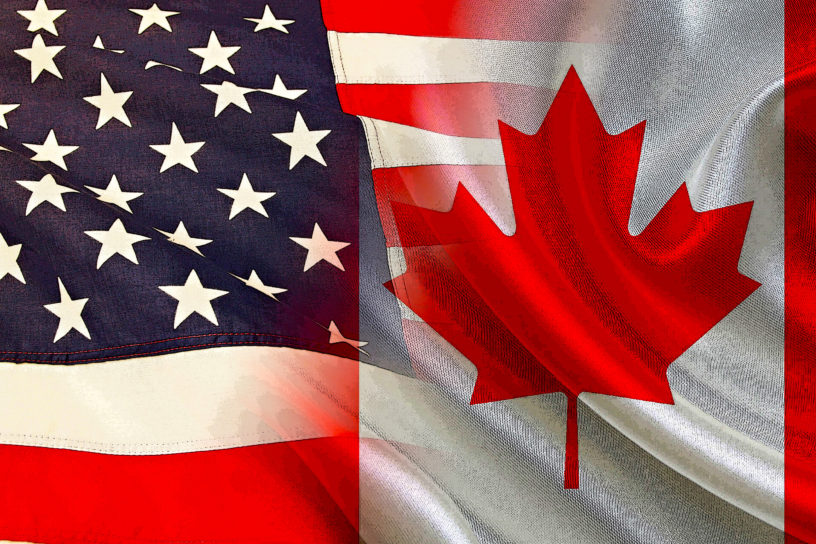By Daniyah Yaqoob
Toronto Metropolitan University (TMU) students are beginning to respond to American President-elect Donald Trump’s recent win in the 2024 United States (U.S.) presidential election.
Many students at TMU—especially international students from the U.S. and Canadian-American dual citizens—followed the 60th U.S. election cycle closely. Though they may be geographically distanced from the States, students believed the election would impact them and was important to follow.
Mia Greenidge, a first-year RTA media production student at TMU, said she was keeping an eye on the election. She’s originally from California and although she is also a Canadian citizen, she considers the U.S. home.
“I was keeping up with the election all day and feeling very anxious and just really, really worried to see the results,” said Greenidge.
She said she forced herself into bed after a day of refreshing polling data. When she woke up the next morning, a message from a friend notified her of the results.
“[My friend] just said, ‘I’m so sorry, I really thought that Kamala [Harris] was going to win.’ And I immediately broke down crying,” said Greenidge.
She said “the negative things [Trump] stands for” and the number of people who will be “so drastically affected by him being a president” made her emotional.
Iliyan Karim, a fifth-year business management student at TMU, also spent election night tracking Trump’s margins to victory.
“I kind of assumed [Trump] was going to win,” said Karim, a Canadian-American dual citizen. “It wasn’t much of a shock.”
Along with Trump’s victory comes an additional layer of authority he did not have in his 2016 presidency: Republican control over the Senate and lead for control of the House of Representatives.
“I think the biggest thing Canadians and myself have to worry about is prices”
Robert Speel, a political science professor at the University of Pennsylvania and adjunct professor at TMU, said Canadians can expect U.S. policy changes that will affect their lives as well.
“A lot of things that happen in the United States influence [Canadian] life, the economy, how much things cost. So you want to pay attention to stuff like that,” he said.
Carter Henry, a second-year international Image Arts photography student from Wisconsin, said he does not plan on permanently living in Canada—but no matter which side of the border he’s on, he’s preparing to feel the effects of U.S. policy changes.
“I think the biggest thing Canadians and myself have to worry about is prices,” he said.
Trump has supported 10 per cent tariffs on all global imports—including Canada, who consider the States to be their biggest trading partner.
“That would significantly hurt us,” said Ronald Stagg, professor emeritus of the history department at TMU.
Right now, Canada is protected by the United States-Mexico-Canada free trade agreement. But with a renewal due in 2026, Stagg said the president-elect and his “unpredictable” nature may get away with the tariffs anyway.
American-Canadians like Greenidge also worry about their family in the U.S. and how Trump’s presidency will impact social causes such as climate change, women’s reproductive rights and deportation threats to migrants in the country.
Greenidge said she recalls the U.S. leaving the Paris Climate Agreement—a legally binding international treaty on climate change—in 2019 during Trump’s previous presidency. After the U.S. rejoined the agreement in 2021 under current U.S. President Joe Biden, Greenidge said she is “extremely worried” Trump’s administration will leave the agreement again.
Trump has not released an official climate agenda as of yet. Nevertheless Speel said Trump is “definitely going to throw out” any progressive climate change policies in the U.S. and it has the potential to shape Canada’s attitude as well.
“Support for climate change policies has been deteriorating and Canada’s people don’t want to pay higher prices for various things,” he said. “Will Canadians suddenly be more in favour of regulations to prevent climate change or will Canadians just go along with what Trump is doing? We don’t know yet.”
Trump’s attitude towards women’s rights, especially their reproductive rights, is also a point of concern. The 4B Movement has started trending among American women—a movement created by South Korean women in the mid-to-late 2010’s—where they “boycotted marriage, dating, childbirth and sexual intercourse with men” to reclaim agency over their bodies. Women in Canada are also beginning to worry about how the president-elect might influence their own access to reproductive health.
Theresa Carlson, a first-year creative industries student, is preparing for what a Trump presidency will mean for women’s rights in the States. Though she is a Canadian citizen, she is worried about how Trump’s position on reproductive rights may cause health risks for women.
“I can imagine there’s going to be a lot of misunderstanding, as per usual, when it comes to women [and] women’s health,” she said.
As of now, Trump has said he will not sign a federal abortion ban—and that states would create their own policies. However, his vice-president-elect, JD Vance, suggested he might support a national ban. According to NBC News, the lack of clarity on the party’s stance is causing concern for the future of reproductive health.
Carlson is diagnosed with endometriosis. She said because of Canada’s long wait times for treatment, she hoped to travel to the U.S. to receive faster care—but with Trump’s presidency and his threat to reproductive rights, she said she might have to let go of her hope to get properly informed care from across the border.
“My hopes…are just shutting down very quickly. And that’s just extremely heartbreaking because I desire to live life just like everybody else does,” she said.
Perhaps most significantly, both Stagg and Speel said the U.S. election would not just influence American-Canadian relations, but also Canada’s domestic politics.
“I have suspicions that a Trump presidency may actually help Justin Trudeau and the Liberal Party,” Speel said. He said once Canadians assess how Trump’s policies are enacted in the U.S., they may be inclined to separate from the Conservative Party of Canada who may platform some similar plans if federally elected in the future.
“If you’ve got Trump in office next year for several months before an October election and Trump is doing all kinds of things that are not popular…you may get a fair number of Canadians who said, ‘Well, we don’t want to be the United States,’” Speel said.
Stagg also said Trump’s return to power in the U.S. could fuel a divide in Canada and the rise of a stronger “right-wing” movement.
“The splits in American society are just starting to show in Canada. The Conservative Party is playing on that,” Stagg said. “[With Trump’s win], the right-wing will become stronger.”
Hours after the news that Trump won the election, Greenidge said she was still angry—but had accepted that Trump would be the next American president. She advised Canadians to be informed on the approaching election.
“Canadians should be staying informed on what’s happening [in the U.S.] and preparing for their election… ensuring that they know what they want for their future,” she said.












Leave a Reply